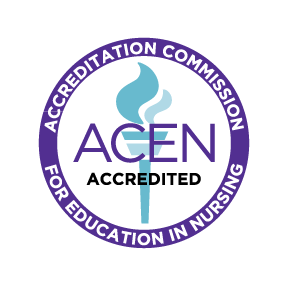An Admissions Counselor
Can Help You:
Finish your degree sooner | Make college affordable | Create a plan to achieve goals
Fill out our 3-Step form to get started
Online LPN to Bachelor of Science in Nursing
It’s Your Time – Earn Both an AAS and Bachelor’s in Nursing
If you’re a working LPN or LVN, Excelsior provides the perfect pathway to advance your career and earn both your Associate in Applied Science in Nursing and Bachelor of Science in Nursing. This streamlined dual degree program helps you build on the experience you already have and prepare for greater opportunities to come your way. The program lets you learn at your own pace using online courses.
In the AAS in Nursing part of the program, you’ll build your knowledge of nursing theory and demonstrate your RN-level competency in a clinical setting by participating in online laboratory experiences and two clinical courses with live experiences in acute-care hospitals.
Once you’ve completed all associate-level requirements, you can seamlessly continue to the bachelor’s-level courses where you’ll focus on population-based health, the role of registered nurses in influencing health care delivery, and both collaborative and individual practice experiences.
Excelsior offers unparalleled support throughout the program as you learn from instructors with decades of real-world nursing experience and build lasting connections with your fellow nurses.
Note: Students must have an active and unencumbered RN license to complete the bachelor’s degree requirements.
Learn about the LPN to Bachelor of Science in Nursing admissions requirements.
Fast Facts:
41% of hospitals and other healthcare settings are requiring new hires to have a BS in Nursing. (Source: Aacnnursing.org)
Nurses with a BS in Nursing can work in high-paying specialty fields like intensive care, pediatrics, and obstetrics. (Source: Nursejournal.com)
Graduates with a BS in Nursing have a 94% job placement rate 4-6 months after completing their degree. (Source: Aacnnursing.org)
121
credit hours
Online LPN to Bachelor of Science in Nursing Program Details
General Education Component (31 Credits)
- Cornerstone Course
- Information Literacy
- Written English Requirement
- Humanities
- Social Sciences
- Life Span Developmental Psychology Core
- Sociology Core
- Natural Sciences and Mathematics
- Anatomy and Physiology Core
- Microbiology Core
- Mathematics
- Arts and Sciences Electives
Associate Degree Nursing Component (34 Credits)
Phase I
NUR 101 Introduction to Professional Nursing
This introductory course focuses on the competencies and core values inherent in the role of the Registered Professional Nurse. Collaboration with interprofessional healthcare team members is presented. Assignment, delegation, and supervision responsibilities of the Registered Professional Nurse, as well as legal influences, ethics, and scope of practice are explored.
NUR 104 Essentials of Nursing Care: Health Safety
This content focuses on the use of nursing process to provide and manage patient-centered care for persons across the lifespan. Therapeutic communication, stress and adaptation, and patient-teaching are discussed. Documenting and reporting nursing care and the use of informatics in health care are presented. The concepts of health promotion, maintenance, obtaining a health history and the techniques of physical assessment are presented. Attention to safe and effective care with respect to environmental safety needs, emergency preparedness, use of restraints, infection control and the prevention of pressure ulcers is explored. Pharmacology, safe medication administration and related nursing care are also addressed.
NUR 105 Essentials of Nursing Care: Health Differences
Patient-centered care addressing the promotion of health and achievement of optimal outcomes for patients experiencing health problems related to nutrition, elimination, oxygenation, fluid and electrolyte balance, activity and sleep is presented in this requirement. Knowledge of anatomy and physiology and the nursing process is used to support nursing judgment. Ethical and legal implications along with evidence-based standards of nursing practice are presented in relation to safe, quality nursing care for patients and families across the life span.
NUR 109 Foundations of Nursing Practice
This requirement focuses on the application of the nursing process to support nursing judgment for the provision of evidence-based, patient-centered care. This requirement also includes the care of culturally diverse patients experiencing health problems related to discomfort, pain, and sensory impairment. Growth and development and its relationship to health, injury prevention, illness, and continuity of care in a variety of settings are discussed. Chronic illness, disability, and end-of-life needs are addressed. Pertinent ethical, legal, and regulatory requirements, along with the standards of professional nursing practice, are addressed. Principles, concepts, and theories from the natural and social sciences in relation to safe nursing care are applied to patients and families across the life span.
Phase II
NUR 209 Reproductive Health
The care of patients and families across the life span with needs related to human sexuality, childbearing, congenital anomalies, genetic disorders, and male/ female reproductive disorders is the focus of this requirement. Evidence-based, culturally sensitive nursing care, standards of professional nursing practice, as well as ethical, legal, and regulatory requirements are addressed. Principles, concepts, and theories from the natural and social sciences in relation to safe, quality nursing care are applied to patients and families across the life span.
NUR 211 Health Differences Across the Life Span 1
This requirement focuses on the application of the nursing process to support nursing judgment and the provision of patient-centered care for patients with acute and chronic cardiovascular and respiratory health problems, impaired blood cell formation, and abnormal cell growth. Evidence-based, culturally sensitive nursing care, standards of professional nursing practice, as well as ethical, legal, and regulatory requirements are addressed. The natural and social sciences are applied to the delivery of quality nursing care for patients and families across the life span.
NUR 212 Health Differences Across the Life Span 2
This requirement focuses on the application of the nursing process to support nursing judgment and the provision of patient-centered care. A wide variety of health problems are presented. These include mental health disorders, cognitive impairment, diabetes mellitus, and dysfunction of endocrine, hepatic, biliary, renal, and pancreatic systems. Evidence-based, culturally sensitive nursing care, standards of professional nursing practice, as well as ethical, legal, and regulatory requirements are addressed. The application of anatomy and physiology, microbiology, and social science concepts is essential for the provision of safe quality patient care.
Health Differences Across the Life Span 3
This requirement focuses on the application of the nursing process to support nursing judgment and
the provision of patient-centered care for persons with health problems related to infectious and communicable diseases, tissue trauma, neurological dysfunction, and musculoskeletal disorders. Content areas include immune function, chain of infection, perioperative nursing, and neuromuscular functional assessment. Health problems such as HIV/AIDS, tuberculosis, hepatitis, degenerative diseases, stroke, and trauma are highlighted. Evidence-based, culturally sensitive nursing care, standards of professional nursing practice, as well as ethical, legal, and regulatory requirements are addressed. Principles, concepts, and theories from the natural and social sciences in relation to safe quality nursing care are applied to patients and families across the life span.
Clinical Nursing Practicum: Care of Patients Across the Lifespan
In this clinical course, students focus on application of contemporary competencies and practice guidelines for delivery of safe, quality patient care. Laboratory experiences provide opportunity for further development of nursing judgment applicable to the clinical environment. Students provide direct care for patients across the lifespan who are experiencing non-critical medical-surgical conditions in the acute care setting. Students are scheduled for clinical experiences and are required to travel to clinical site during the course term. Satisfactory grades in the laboratory and clinical experience are required to pass the course.
Phase III
Competencies for Contemporary Nursing Practice
This course is designed for students to apply competencies for contemporary nursing practice. Safety, teamwork and collaboration, evidence-based practice, quality improvement, leadership and delegation, informatics, and professional role development are studied. Students will engage in weekly, faculty-facilitated virtual clinical experiences while caring for clients in a variety of care settings, across the lifespan. Satisfactory application of competencies in the virtual clinical experience is required to pass the course.
Nursing Capstone: Advanced Clinical Practicum
The content in this clinical course will assist students to further develop their role as a member of the profession and continue to prepare them for professional nursing practice. Emphasis is on advanced skills, knowledge, judgment, and professional values. This course includes a laboratory and a dynamic clinical practice experience caring for multiple patients in a healthcare facility. Students are scheduled for clinical experiences and are required to travel to clinical site during the course term. Satisfactory grades in the laboratory and clinical experience are required to pass the course.
Bachelor’s-Level General Education Component (30 Credits)
- Written English Requirement 2
- Humanities
- Ethics Core
- Social Science Elective
- Statistics
- Natural Sciences Elective
- Arts & Sciences Electives
Bachelor’s Nursing Component (26 Credits)
Phase IV
NUR 301 Bridge for Professional Socialization
This course expands on the content of NUR 101 and focuses on the student transitioning to the role of a baccalaureate prepared nurse. Professional nursing concepts are expanded on and the pivotal role nurses play in health care is emphasized. Building on previous knowledge and experience, students participate in intellectual dialog on the role of the nurse in a diverse society, and examine how their own professional development can affect policy changes within the profession and in health care. Promoting critical analysis through a person-centered care experience will transform and create new ways of approaching professional practice.
NUR 338 Introduction to Informatics for Nurses
This course provides knowledge about the roles and skills in information management and the application of technology to inform nursing practice. Emphasis is placed on technological supports for patient care interventions and the use of decision-support systems to gather evidence to guide practice. The use and understanding of standardized terminologies and the role of information technology in improving patient outcomes and creating a safe environment will be included.
NUR 342 Holistic Health Care Across the Life Span
This course focuses on applying concepts of health promotion, as well as illness, disease, and injury prevention to health assessment across the life span. The student integrates the core concepts (critical thinking, communication, research, role development, caring, and cultural competence) into a holistic approach while functioning in the professional nursing role. Health and physical assessment data are gathered, analyzed, and synthesized by the student to develop a personal health plan for a client that promotes health and prevents disease.
NUR 356 Leadership and Management in Nursing
This course analyzes the interrelated relationship between leadership and decision making, and examines how wisdom, research, personal values, and theory enhance leadership and decision-making skills.
Phase V
NUR 430 Research in Nursing
This course focuses on knowledge and skill acquisition related to research process. Evidence-based practice, critical thinking, critical reading, and the baccalaureate nurse’s role in the application of research to practice are emphasized. Course content examines the foundations of research, the research process, quantitative and qualitative research designs, as well as evaluation of a quantitative research study.
NUR 446 Teaching and Learning in a Diverse Society
This course focuses on the role of the nurse as educator and the ability to teach a group of adult clients with a shared learning need. Theory and research-based evidence from nursing and other disciplines are integrated with concepts of caring and cultural competence, health promotion, behavioral change, and principles of teaching and learning. Application of the education process is emphasized. In partnership with clients, the student develops, implements, and evaluates a teaching plan designed to produce a desired change in behavior.
NUR 448 Community Health Nursing: Caring for the Public’s Health
This course integrates evidence, theory, standards, and knowledge from nursing, public health, and other disciplines to guide population-focused nursing practice. Importance is placed on the application of the core functions of public health: assessment, policy development, and the assurance of available and necessary health services for diverse populations. Emphasis is placed in identifying determinants of health, advocating for vulnerable populations, prioritizing primary prevention, and utilizing available resources to improve the health of populations. Population-focused nursing involves assessing the health care needs of a specific population and making health care decisions for the population as a whole rather than for individuals. This course includes practice experiences in the community.
Phase VI
NUR 462 Nursing Capstone
This capstone course focuses on integration and synthesis of knowledge, skills, and competencies from nursing, other disciplines, and the arts and sciences. Application of specific concepts and theories, such as communication, critical thinking, and leadership, enables students to transform theory to practice within health care systems. This course includes practice experiences.
Surveys are administered to our nursing program students upon graduation and at one year post-graduation. The survey results are available here.
View our catalog for additional information.
Common Careers with an
Online LPN to Bachelor of Science in Nursing

- Nurse entrepreneur
- Patient care in high-activity units, such as intensive care units
- Patient care in outpatient settings
- Supervisory position in long-term care
- Travel nursing
Explore Common Careers

Caleen Oliver
BS in Nursing, 2015
Recognitions & Accreditations
ACEN Accreditation
The bachelor’s component of the LPN to Bachelor of Science in Nursing program is accredited by the Accreditation Commission for Education in Nursing (ACEN). A student must complete the bachelor’s-level component of this program to graduate from an ACEN-accredited program. The associate-level component of this program is not accredited by ACEN.
Accreditation Commission for Education in Nursing (ACEN)
3390 Peachtree Road NE, Suite 1400
Atlanta, GA 30326
404-975-5000
The most recent accreditation decision made by the ACEN Board of Commissioners for the bachelor’s nursing program in March 2019 is Continuing Accreditation.
View the public information disclosed by the ACEN regarding Excelsior programs at acenursing.us/accreditedprograms/programSearch.htm.
New York State Board of Regents – Recognized Programmatic Accreditation
Excelsior University’s associate-level nursing programs are programmatically accredited by the New York State (NYS) Board of Regents, State Education Department Office of the Professions (the Regents). The U.S. Department of Education has recognized the Regents as a state agency for the approval of nursing education programs since 1969. More information about the NYS Board of Regents’ Recognized Programmatic Accreditation may be helpful for students or graduates to present to a school they are attending or to an employer seeking more information about their Excelsior University nursing degree.
Institutional Accreditation
Excelsior University is an accredited institution and a member of the Middle States Commission on Higher Education (MSCHE or the Commission) www.msche.org. Excelsior University’s accreditation status is accreditation reaffirmed. The Commission’s most recent action on the institution’s accreditation status on June 23, 2022 was to reaffirm accreditation. MSCHE is recognized by the U.S. Secretary of Education to conduct accreditation and pre-accreditation (candidate status) activities for institutions of higher education including distance, correspondence education, and direct assessment programs offered at those institutions. The Commission’s geographic area of accrediting activities is throughout the United States.
All of Excelsior University’s academic programs are registered (i.e., approved) by the New York State Education Department.


